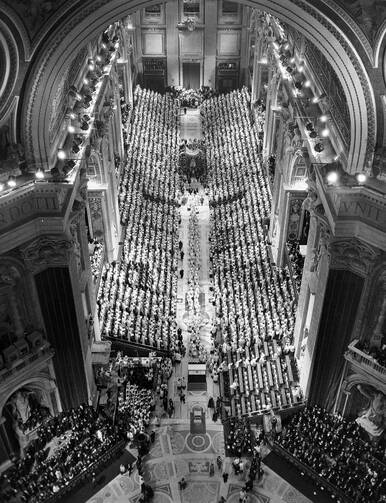Two weeks ago, the 50th anniversary of the assassination of President John F. Kennedy took us back to Dallas. We remember where we were when we heard of the shooting. Today, Dec. 4, we recall another 50th anniversary, that of the approval of the first decree passed at the Second Vatican Council, Sacrosanctum Concilium, the Constitution on the Sacred Liturgy. It was approved by the assembled bishops by a vote of 2,147 to 4 and promulgated by Pope Paul VI on this day in 1963.
The use of the vernacular in the Mass, the new enriched cycle of Scripture readings and increased active participation by the laity are a few of the fruits of this document. And, as we have experienced with the recent translation of the texts for the Roman Missal, the debate goes on. Rather than enter directly into that debate, I suggest it might be more fruitful to celebrate the anniversary by re-visiting the document.
The document aims to revitalize not only the Eucharist, but all seven sacraments and sacramentals. It also treats the Divine Office, Sacred Music and Sacred Art. Well worth re-reading! Here are a few paragraphs from it, to recapture some of its flavor and challenge.
10. Nevertheless the liturgy is the summit toward which the activity of the Church is directed; at the same time it is the font from which all her power flows. For the aim and object of apostolic works is that all who are made sons of God by faith and baptism should come together to praise God in the midst of His Church, to take part in the sacrifice, and to eat the Lord's supper.
14. Mother Church earnestly desires that all the faithful should be led to that fully conscious, and active participation in liturgical celebrations which is demanded by the very nature of the liturgy. Such participation by the Christian people as a chosen race, a royal priesthood, a holy nation, a redeemed people (1 Pet. 2:9; cf. 2:4-5), is their right and duty by reason of their baptism.
In the restoration and promotion of the sacred liturgy, this full and active participation by all the people is the aim to be considered before all else; for it is the primary and indispensable source from which the faithful are to derive the true Christian spirit; and therefore pastors of souls must zealously strive to achieve it, by means of the necessary instruction, in all their pastoral work.
50. The rite of the Mass is to be revised in such a way that the intrinsic nature and purpose of its several parts, as also the connection between them, may be more clearly manifested, and that devout and active participation by the faithful may be more easily achieved.
For this purpose the rites are to be simplified, due care being taken to preserve their substance; elements which, with the passage of time, came to be duplicated, or were added with but little advantage, are now to be discarded; other elements which have suffered injury through accidents of history are now to be restored to the vigor which they had in the days of the holy Fathers, as may seem useful or necessary.
127. All artists who, prompted by their talents, desire to serve God's glory in holy Church, should ever bear in mind that they are engaged in a kind of sacred imitation of God the Creator, and are concerned with works destined to be used in Catholic worship, to edify the faithful, and to foster their piety and their religious formation.
Clearly the Spirit was at work 50 years ago, and continues to work today on this 50th anniversary.








